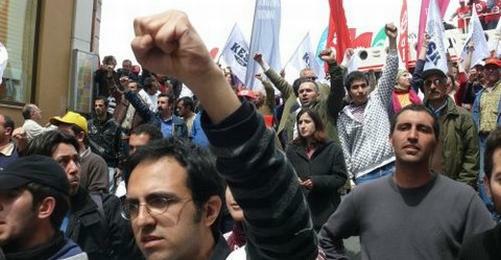On 27-28 June, a gathering to bring together groups and individuals of the left, organised by the "Umbrella Party Iniative", took place in Ankara. Entitled "Unity for Democracy Conference", the gathering offered a base from which to move forward. On the first day, bianet coordinator Ertuğrul Kürkçü spoke, and excerpts of his speech are translated here:
[...]
First I want to say this: there is a visible difference between this meeting and that held on 20-21 December, a difference in nature, maturity and composition. Some may be disappointed, but others may see it as more consistent.
Historical alliance
From whatever perspective you look at it, there is still a difference, but I would like to look at the emerging context, with which I am, to be honest, pleased. I am extremely pleased at the fact that, in a social context, social inequalities are being expressed and that it is becoming more valid to look at things from the point of view of workers, the oppressed, the poor and the marginalised. I believe that I have contributed to this, even if it was in a tiny way. According to some this means "messing up arrangements". However, when I see how these struggles have helped us to think more clearly, I am even more pleased.
The problem we are now facing and trying to solve was brought up by the Kurdish movement's historical development. We did not bring up this issue, we did not define it, it came to us historically. The Kurdish movement brought this problem to us and asked, "Do you want to form a historical alliance, a permanent, lasting structure?"
We are now discussing the answer to this question. "Generally, we want to, but how?" No matter how much respsect we show the historical struggle, when logic comes into play we must be allowed to criticise things.
If we are going to solve the problem, then we must have equal rights in the solution. W emay not have the same power, but that does not matter. In the court of the mind, everyone and everything is equal.
What we need to realise is this: The representatives of Kurds living in Turkey are aware that they are representing millions of people who experience poverty, employment and labour issues and marginalisation, and they have thus reached out, not to all democrats, but to those democrats who have projects that will lead to permanent, radical and fundamental change.
Social unity
[...] Inevitably, the issue of "democratic unity" is also an issue of social unity. If we want to achieve democracy in the republic we live in, if we want to limit the power of those in power and want to offer an alternative, we must limit the power of capital. Because the power of capital cannot be limited without limiting its influence on possessions, this means a class struggle.
That is why I am extremely happy that Kurdish socialists and Kurdish revolutionaries are totally aware of this issue and are increasingly putting labour rights, the labour struggle, labour liberation on the agenda of a common struggle of Turkish and Kurdish proletarians.
For the first time since the 1960s, this offers us the opportunity to close the opened circle, as Kurdish and Turkish socialists, revolutionaries, people, proletarians are discussing a shared organisation.
In fact, this is the second revolution in the history of our social struggle, and we are trying to offer this moment what it deserves.
When these two great currents come together, this also mobilises other trends. Everyone demanding freedom, feeling oppressed or marginalised for some reason, everyone starts moving towards this point, can start moving towards this point if we create this possibility. If we start speaking up for the rights of the oppressed [...], then we can be on the side of all the differences and all the oppressed in Turkey. Then the space opening up in front of us will be a deep historical alliance.
[...]
DTP realises importance of workers' movement
When I interpret the experience of the Kurdish revolutionary movement, I believe there is advice there for everyone to follow. Particularly the evaluations which the Democratic Society Party (DTP) made after the local elections in March are vitally important in my opinion:
When the DTP evaluated the election experience, it concluded that it was not possible to reach Kurdish workers who had migrated from the region to the west of Turkey just on the basis of identity and a discourse of independence. Rather, there are social demands. "When these social demands are left unanswered, this turns into support for parties that are not close to us at all, that even oppose us. In order to undo this, we need new strategies, a new discourse, a new language."
[...]
A new language
Thus we are again learning to speak new languages. In the West, we are learning the language of pain from oppressed Kurds, while the DTP is learning the language of social opposition against the Justice and Development Party's (AKP) and the government and against US projects.
[...]
No determination but that for a world without borders, classes, nations, states and flags, a united world, could have brought us together. That is why we follow not the call of others but the call of Kurdish revolutionaries. That is why we support them. That is why the unity we will create will be based on this basis, on this historical aim, on these humane values.
If that is the case, then those who do not want to be part of this are, as we said in December, despicable. (EK/AG)

